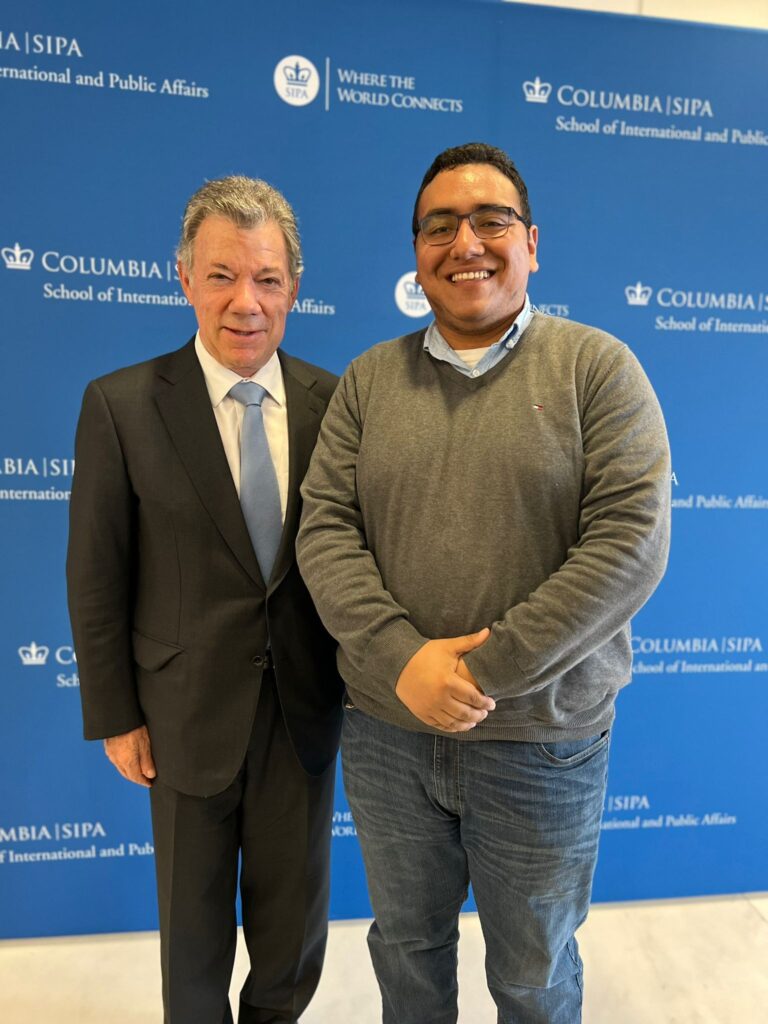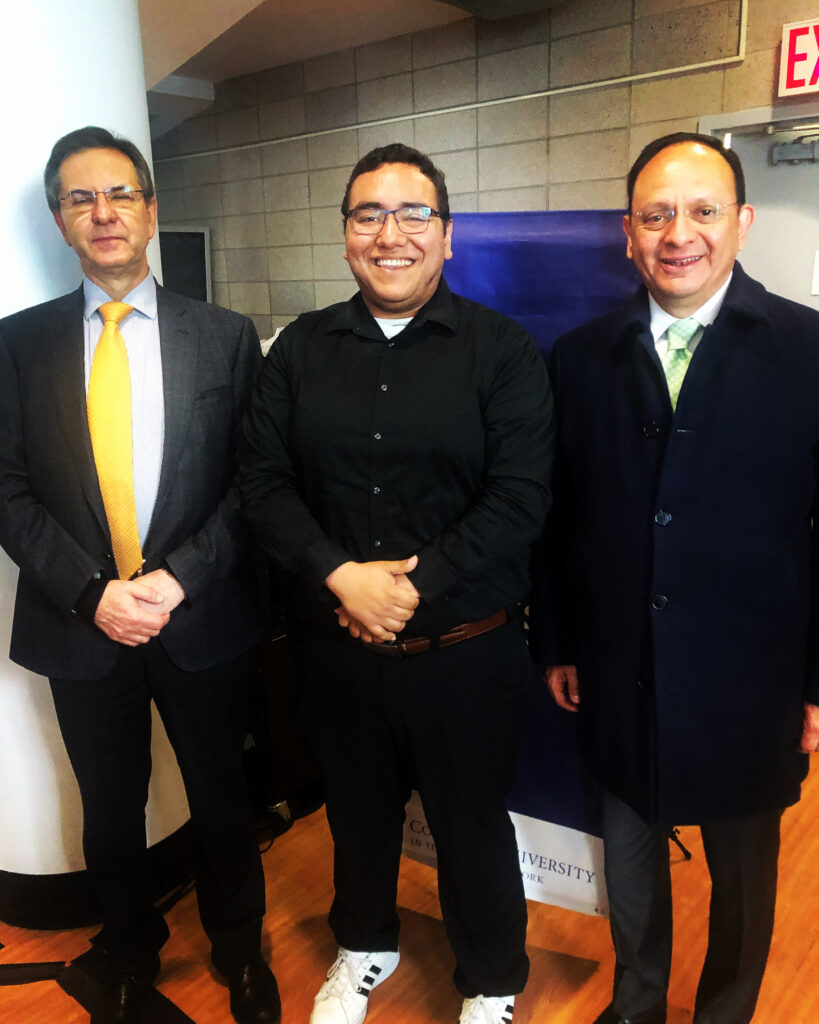My Journey Through Columbia University’s Political Science M.A. Program
“How do you think Bolivia’s and other Latin American country’s cooperation with China’s Belt and Road Initiative will benefit your efforts to create an “economy of Mother Earth” and find alternative methods of combating climate change?” As a Political Science M.A. Candidate at Columbia University, I asked Bolivian President Luis Arce Catacora this question during Columbia University’s 2021 World Leaders Forum, which overlapped with the United Nations’ General Assembly Week.
In his response, President Arce emphasized his role at international economic forums as an ardent advocate for technology transfer from more affluent countries, such as China, to Bolivia and the developing world. The following semester, I would have the distinct privilege of asking similar questions focused on Sino-Latin American relations to former Colombian President and Nobel Peace Prize Winner Juan Manuel Santos and Mexican Ambassador to the US Esteban Moctezuma. Experiences like these served as the foundation for an article on Taiwanese-Latin American relations that I published post-graduation in the Taipei Times.
Unique Academic and Research Opportunities
This access to global leaders in the political realm was merely one of the hallmarks of the Columbia M.A. experience. As a Sino-Latin American relations-focused researcher specializing in comparative politics and quantitative political methodology, I took a wide range of courses during my year at Columbia, ranging from game theory to applied regression analysis in R programming courses to international political economy. For example, for the program’s M.A. Proseminar, I had the privilege of collaborating with a few of my peers in delivering a presentation on an assigned book titled Welfare for Autocrats, written by Stanford University’s Professor Jennifer Pan. We even had the opportunity to interview Professor Pan virtually for this assignment!
I would also often attend doctoral-level seminars in political economy, comparative politics, and quantitative political methodology. These would feature guest scholars from other elite institutions, such as other Ivy League institutions and top global universities like Oxford University, National University of Singapore (NUS), and Australian National University. For example, in the Spring 2022 semester, Professor Soo Yeon Kim from NUS presented a talk titled “Membership and its Benefits: Veto Shares in the Asian Infrastructure Investment Bank” based on her paper. In addition to these guest lectures, my M.A. cohort peers and I were also welcome to attend job talks from candidates seeking to become professors in the department as well as workshops led by the PhD students.
One thing that makes Columbia’s M.A. program unique is that it is also equivalent to the first year in their PhD program, so I often found myself taking graduate-level courses alongside Political Science PhD students. Beyond the coursework, I also served as a research assistant for the Director of the M.A. Program, Dr. Chiara Superti, and her PhD advisee. I assisted with gathering data on expatriate voter behavior in Western Europe and Latin America. From communicating with the national electoral institutes of Latin American countries in Spanish to compiling cross-national, cross-panel spreadsheets of relevant data, I gained invaluable exposure to scholarly research in an emerging field in electoral studies and an understanding of how my regression analysis studies could contribute to publishable research in academia.
My advisor, Professor Junyan Jiang, and other Columbia faculty I took courses with like Professor Maria V. Murillo and Professor Andrew Nathan also offered an abundance of expertise and guidance as I considered a number of career paths, from PhD studies en route to a career in academia or other careers in international education and public service. Now that it’s been two years since graduating from the program, I find that the program not only deepened my understanding of how political science is taught at the graduate and undergraduate level, but also what it takes for political science aspirants in high school to gain admission into a prestigious program like Columbia’s, which ranks highly in the field.



How Aspiring Political Science Students Can Build a Competitive Profile in High School
Drawing from my experience at Columbia and years of advising students, here’s the guidance I offer to high school students seeking to stand out in the US college admissions process as applicants selecting political science or related fields as their major:
1. Gain Practical Experience Through Internships and Volunteer Work
One of the best ways to demonstrate your commitment to political science is through internships or volunteer roles with public officials, candidates running for office, or other civic engagement initiatives (e.g., voter registration drives), government bodies (e.g., school boards), or NGOs. This hands-on experience highlights civic engagement and allows you to understand the intricacies of public service. Colleges like Columbia value applicants with real-world exposure to policy and public administration because it signals a student’s readiness to address complex issues.
2. Combine Political Science with Another Academic Interest Through a Signature Project
Top-tier political science programs seek students with interdisciplinary knowledge. Combining political science with another field—such as computer science, data science, or environmental science—can set you apart. I encourage students to undertake a signature project that combines these interests, such as a research project, business or nonprofit venture, or community initiative. A student interested in statistics, for instance, might use data science to analyze and visualize voter behavior trends for the general public, while someone passionate about environmental science could explore the political impacts of climate policy.
This type of interdisciplinary work not only strengthens your application but also gives admissions committees a glimpse into your unique intellectual profile and problem-solving approach.
3. Attend Selective Summer Programs in Political Science and Leadership
Summer programs like the Coolidge Senators Program, Yale Young Global Scholars, and the US Department of State’s NLSI-Y Program offer immersive experiences in political science, leadership, and global affairs. Participation in these selective programs is a strong indicator of a student’s academic preparedness, curiosity, and drive. Not only do they build knowledge and skills relevant to political science, but they also help you connect with peers and mentors who share your interests, potentially leading to lifelong collaborations. At InGenius Prep, we are experts in helping students bring out the best in their summer program applications to these kind of selective programs.
4. Compete in Well-Known Competitions Related to Political Science
If you are able to earn an award from well-regarded competitions such as the John Locke Essay Competition, the Cambridge Re:think Essay Competition, and National History Day, that could set you apart as political science applicants. Success in these competitions signals to admissions committees that you possess the analytical skills, writing ability, and dedication necessary for top-tier programs. Competitions also provide a platform for you to delve into specific political or historical topics that resonate with your personal interests, helping you build expertise and a distinct voice.
5. Build Critical Thinking Skills Through Extracurricular Activities and Daily Habits
Activities like debate, Model United Nations, and student government develop essential skills in critical thinking, public speaking, and problem-solving. These qualities are key in political science and are highly valued by admissions committees. Leadership in these areas also signals your commitment to understanding and addressing societal issues. Further, I also highly recommend that you keep up to date with current events through a publication like The Economist or Foreign Policy. If your application is able to reflect a well-rounded approach to solving real-world problems and your knowledge of current affairs relevant to policy impact that you have enacted, then your candidacy for admissions as a political science candidate will be strengthened.
Taking the First Steps in Your Political Science Journey with Confidence
By combining hands-on experience, interdisciplinary projects, and participation in selective programs, high school students can build a profile that reflects both depth and versatility. For students aspiring to study political science at Columbia or other elite institutions, this blend of academic rigor, civic involvement, and analytical skills can make a meaningful difference in both their applications and their future contributions to the field.
Through my time at Columbia and beyond, I’ve seen the value of these experiences, and I encourage aspiring political scientists to explore them wholeheartedly.
Need additional guidance taking the first steps in your political science journey? Contact us today for a free consultation to learn how our expert counselors can guide you in your college admissions journeys.